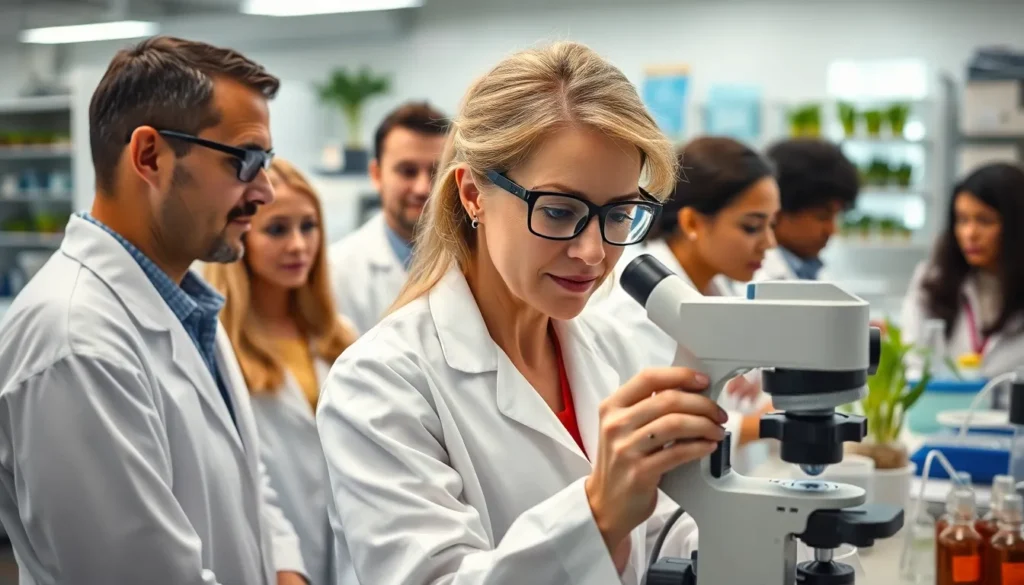Table of Contents
ToggleBiotechnology stands at the forefront of innovation, merging biology with technology to revolutionize industries. From healthcare breakthroughs to agricultural advancements, it’s reshaping how we understand and interact with the world around us. This dynamic field harnesses living organisms and biological systems to develop products and solutions that enhance quality of life.
As global challenges like food security, disease management, and environmental sustainability loom, biotechnology offers promising avenues for progress. By utilizing genetic engineering, cell culture, and molecular biology, scientists are unlocking new potentials that could redefine our future. Exploring the vast landscape of biotechnology reveals not just scientific advancements but also ethical considerations and societal impacts that shape its trajectory.
Overview Of Biotechnology
Biotechnology integrates biological science with technology to develop products and processes. This multidisciplinary field encompasses various techniques, such as genetic engineering, molecular biology, and bioprocessing, to transform raw materials into valuable products.
Key Areas of Biotechnology
- Healthcare Biotechnology
Healthcare biotechnology focuses on developing medical therapies and diagnostics. Innovations like monoclonal antibodies and gene therapies exemplify the advancements made in treating diseases.
- Agricultural Biotechnology
Agricultural biotechnology enhances crop yields and resilience through genetic modification. Genetically modified organisms (GMOs) resist pests, withstand drought, and provide improved nutritional content, addressing food security.
- Environmental Biotechnology
Environmental biotechnology applies biological processes to solve environmental issues. Bioremediation techniques remove pollutants from soil and water, promoting sustainability and ecosystem health.
- Industrial Biotechnology
Industrial biotechnology optimizes production processes in manufacturing. Enzymes and microorganisms play critical roles in producing biofuels, biodegradable plastics, and other sustainable materials.
Applications and Benefits
Biotechnology benefits society through various applications. It improves healthcare outcomes, increases food production, and fosters environmental conservation. Moreover, advancements reduce reliance on chemical pesticides and fertilizers, promoting safer agricultural practices.
Ethical Considerations
Ethical considerations in biotechnology include regulatory policies, public perception, and access to technology. The balance between innovation and safety remains crucial as society adapts to the rapid changes within this field. Dialogue among stakeholders, including scientists, policymakers, and the public, drives responsible biotechnology development.
Applications Of Biotechnology

Biotechnology encompasses various applications across multiple fields, each contributing to advancements in health, agriculture, and industry. The following sections detail prominent applications of biotechnology.
Medical Biotechnology
Medical biotechnology utilizes living cells and cell materials to develop diagnostic tools and treatments. Genetic engineering produces monoclonal antibodies, used in targeted therapies for cancer and autoimmune diseases. Gene therapy offers potential cures by correcting defective genes responsible for disease development. Additionally, biomedical devices, such as bioconjugates and biosensors, facilitate disease monitoring and management.
| Application | Description |
|---|---|
| Monoclonal Antibodies | Targeted therapies for cancer and autoimmune disorders. |
| Gene Therapy | Correction of defective genes to treat hereditary conditions. |
| Biomedical Devices | Tools for monitoring diseases effectively and efficiently. |
Agricultural Biotechnology
Agricultural biotechnology enhances crop yields, resilience, and nutritional value through genetic modification. Techniques such as Recombinant DNA technology allow for the introduction of beneficial traits, like pest resistance and drought tolerance. Genetically modified organisms (GMOs) contribute to food security by addressing challenges posed by climate change and population growth. Additionally, biopesticides and biofertilizers reduce dependence on synthetic chemicals, promoting sustainable agriculture.
| Application | Description |
|---|---|
| Genetic Modification | Introduction of beneficial traits in crops. |
| GMOs | Crops engineered for pest resistance and drought tolerance. |
| Biopesticides and Biofertilizers | Natural products that enhance crop health and productivity. |
Industrial Biotechnology
Industrial biotechnology leverages biological processes to develop sustainable materials and products. Bioprocessing techniques optimize the production of enzymes, biofuels, and bioplastics. This field reduces carbon footprints and environmental impact by utilizing renewable resources. Biorefineries convert biomass into valuable chemicals and energy, aligning with circular economy principles.
| Application | Description |
|---|---|
| Enzymes | Catalysts for various industrial processes, enhancing efficiency. |
| Biofuels | Renewable energy sources derived from biological materials. |
| Bioplastics | Sustainable alternatives to traditional plastics. |
Current Trends In Biotechnology
Recent advancements in biotechnology showcase innovative techniques and applications that significantly influence various sectors. Key areas of focus include genomic innovations and bioinformatics, driving progress in healthcare and agriculture.
Genomic Innovations
Genomic innovations play a pivotal role in biotechnological advancements, particularly in personalized medicine and genetic engineering. Techniques like CRISPR-Cas9 enable precise genome editing, allowing scientists to modify genes to treat genetic disorders effectively. Researchers utilize next-generation sequencing (NGS) to decode genomes faster and more accurately, facilitating the identification of disease-associated genes. Genome-wide association studies (GWAS) uncover genetic variations linked to complex diseases, enhancing predictive modeling for patient care. Moreover, advancements in synthetic biology lead to the creation of synthetic organisms programmed for specific tasks, ranging from producing biofuels to synthesizing pharmaceuticals.
Bioinformatics
Bioinformatics integrates biology, computer science, and information technology, significantly advancing data analysis in biotechnology. Software applications analyze extensive biological data, enabling researchers to identify patterns and correlations in genomics and proteomics. Bioinformatics tools assist in drug discovery by modeling interactions between drugs and biological systems, accelerating the development of new therapeutics. The field also Facilitates the management of large-scale genomic datasets, promoting collaboration across research institutions. As personalized medicine gains traction, bioinformatics becomes essential for tailoring treatments based on individual genetic profiles, optimizing therapeutic strategies for diverse patient populations.
Challenges In Biotechnology
Biotechnology faces several challenges that must be addressed to ensure its responsible development and application. These challenges include ethical considerations and regulatory issues.
Ethical Considerations
Ethical concerns arise in biotechnology, particularly regarding genetic modifications and cloning. Stakeholders debate the implications of altering organisms at the genetic level, focusing on potential long-term effects on biodiversity and ecosystems. Ethical dilemmas also include the accessibility of biotechnological advancements, as disparities in healthcare can lead to unequal benefits. Public skepticism about genetically modified organisms (GMOs) and their safety often hinders acceptance, making transparency and education crucial in fostering trust.
Regulatory Issues
Regulatory frameworks for biotechnology are complex and vary by region. These regulations aim to ensure safety and efficacy in biotechnological products, such as vaccines and genetically modified crops. Compliance with regulations can be time-consuming, delaying innovation and market entry. Inconsistent regulations across countries add another layer of complexity, as companies navigate different approval processes. Harmonizing these regulations could streamline development, but it requires extensive collaboration among international regulatory bodies to establish standards that address safety while promoting innovation.
Future Of Biotechnology
The future of biotechnology appears promising, driven by ongoing advancements and interdisciplinary collaboration. Innovations in genomic research stand central to this evolution. Techniques like CRISPR-Cas9 not only enable precise gene editing but also offer solutions for genetic disorders, enhancing the quality of personalized medicine.
Emerging trends in bioinformatics continue to refine therapeutic strategies. This field merges biology with computational tools, facilitating drug discovery and optimizing treatments based on genetic profiles. Companies are increasingly utilizing artificial intelligence to analyze biological data, accelerating research and development timelines for new therapies.
Agricultural biotechnology will likely play a critical role in addressing global food security. Genetic modifications that enhance crop resistance to pests and harsh climatic conditions offer potential solutions to food shortages. The integration of precision agriculture technologies, such as drones and sensors, will optimize resource use, increasing overall crop yields.
Environmental biotechnology is poised for growth as the demand for sustainable solutions rises. Bioremediation technologies utilize microorganisms to clean up pollutants, showcasing a potential pathway for restoring contaminated environments. Furthermore, renewable energy sources derived from biotechnology, such as biofuels, will contribute to reducing dependency on fossil fuels, thus supporting sustainability goals.
Industrial biotechnology is enhancing manufacturing processes through the development of bioproducts. This sector focuses on creating biodegradable plastics and eco-friendly chemicals, promoting circular economy principles. The shift toward sustainable materials will become increasingly essential for industries responding to consumer demand for environmentally responsible products.
Ethical considerations will remain at the forefront as biotechnology evolves. Ongoing dialogues surrounding genetic modifications, cloning, and accessibility to innovations will shape public perception and regulatory frameworks. Stakeholder engagement across sectors must emphasize transparency and inclusivity, ensuring that advancements benefit diverse populations equitably.
Moreover, regional disparities in biotechnology applications signify the need for global collaboration. Harmonizing regulatory standards will facilitate faster approvals for new products, fostering innovation while maintaining safety. Countries can learn from each other’s best practices, building a cohesive international biotechnology framework.
Biotechnology stands at the forefront of addressing some of the world’s most pressing challenges. Its innovative applications in healthcare agriculture and environmental sustainability demonstrate its potential to enhance quality of life. As advancements continue to emerge the importance of ethical considerations and regulatory frameworks becomes increasingly clear.
The future of biotechnology hinges on collaboration among stakeholders to ensure responsible development. By harmonizing regulations and fostering dialogue the industry can navigate the complexities of innovation while prioritizing safety and accessibility. With ongoing research and interdisciplinary efforts biotechnology is poised to transform industries and contribute significantly to global well-being.







